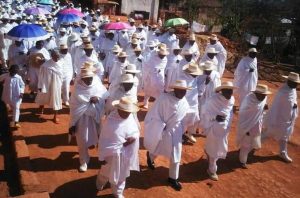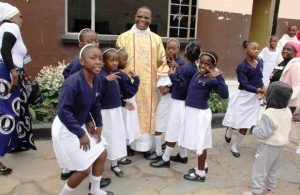“As I can remember, priesthood has always been a dream for me since childhood. I “grew up” in the Church since my family was active in our parish community.” A Comboni Filipino Father Margarito Santiago Garrido III tells us his missionary journey.
When I entered high school, I learned about the mission in a school run by missionary sisters. I enjoyed reading materials about it, especially the missionary work done in the challenging places. I can also remember that when I was still an acolyte in our parish, I liked going with the priests to the barrios, especially coastal areas, to serve in the mass.
My interest in missionary priestly life grew with exposure and encounters with the missionaries. After finishing high school, I entered a public university and earned a degree. Though living like a typical college student, my desire for religious things continued even though I tried to set aside the “call” and tried to pursue other directions in life.
I continued to be active in the parish youth group, and somehow, tried to maintain a spiritual life. Then, after the university, I started working, first in a college and later in the local government, as I was also doing further studies. I always thought that would be my life until I met a Comboni missionary.
At the age of twenty-four, things changed when I met the vocation promoter of the Comboni missionaries. The encounter rekindled my missionary desire, and I started a new journey in life that took me to different places.
In 2007, I entered the formation program of the Comboni missionaries after almost a year of discernment and accompaniment. I started my postulancy at St. Daniel Comboni Seminary in Quezon City where besides spiritual and personal formation, I also studied philosophy.
In those years the experience with the poor, the sick, and the handicapped in our pastoral areas during weekends and vacations further developed my identity as the Comboni missionaries who work among the poor and the most abandoned, and difficult places. I then started my theological studies in UST before I was sent to Mexico to do the novitiate.
The novitiate is an intimate period with God in the formative journey, an intense moment of encounter with Him, trying to listen and finding out His plan for the individual.
Those two years in Mexico nourished not only my relationship with God, but also helped me appreciate the community life and the challenges and beauty of an international community. Further, the experience helps me appreciate other cultures and traditions.
One marking experience I had in Mexico was missionary exposure. We were sent to one of our missions for two months, to the remote town of Metlatonoc along the mountains of Guerrero. That experience with one of the most depressed areas in the country, among the aborigines, confirmed the missionary vocation in me.
In those times, with those poor and humble people, I came to say, this is what I feel I am called to do in my life. After finishing the novitiate, I was sent to Lima, Peru, to finish my theological studies. Besides the studies, we also, on weekends and especially on school breaks, served in different pastoral areas; at times in the slums, in the forest, or somewhere else, which further deepen my identification to the Comboni charism.
After finishing theology, I was sent to Taiwan for my missionary service and started studying Chinese Mandarin. I was ordained deacon in Taiwan a year after taking my perpetual vows. And a couple of months later, in 2016, on my birthdate, I was ordained priest in my home parish. Then, I returned to Taiwan to continue my service in this part of the world where Christians are not more than two percent of the people. I am serving in a small Christian community of St. Anne Parish in Wugu, New Taipei City, among the local and aborigine faithful.
The mission can be challenging and hard at times, but God’s faithfulness to those whom He calls assures not only His consolation and help but also gives the very meaning to what we do in His name wherever we are sent. (Photo: Meeting of the parish council headed by Fr. Margarito Garrido).







